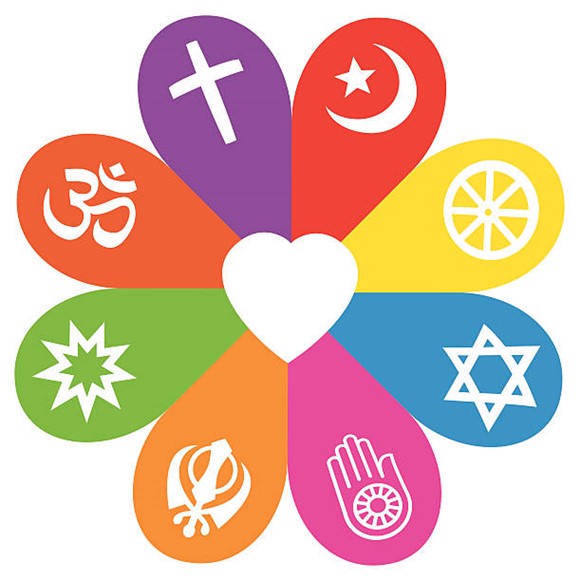- Home
- Editor's Notes
- Current Issue
- Riki Reflects
- Spiritual Traveler
- Starz Emporium
- Classifieds
- Advertise with Us
- Submissions
- Awards
- About Us
- Contact Us
Would Universal Spirituality Solve Religious Division?
By Stephen William
.jpg) Would Universal Spirituality Solve Religious Division?
By Stephen William, author of: ”Nostradamus His Prophecy Finally Explained.” Available on Amazon Kindle now.
Religion has been a cornerstone of human society for millennia, shaping cultures, moral values, and social structures. Yet, despite its profound influence, religion has also been a source of division, conflict, and misunderstanding. The question arises: would the adoption of universal spirituality be the key to resolving religious divisions and fostering global harmony? Perhaps the adoption of universal spirituality would be assisted by Spiritualism which actually demonstrates the reality of Life After Death for people of all races and creeds. .  MAJOR RELIGIONS OFTEN STRIVE TOWARDS COMMON UNDERSTANDING, BUT ARE HELD BACK BY A LACK OF AGREEMENT OF WHAT THE SPIRITUAL DIMENSION ACTUALLY IS. COULD SPIRITUALISM AND MYSTICISM BE THE WAY FORWARD? Universal spirituality refers to the concept of embracing spiritual principles that transcend specific religious doctrines, focusing on the shared values and beliefs that unite humanity. It emphasizes the interconnectedness of all beings, the pursuit of inner peace, and the recognition of a higher power or consciousness that guides life. Unlike organized religion, universal spirituality does not prescribe rituals, dogmas, or exclusive truths. Instead, it encourages individuals to seek their own spiritual path while respecting the diverse beliefs of others. This in many ways is akin to many Spiritualists outlook on spirituality. Religious division often stems from the rigid adherence to doctrines, rituals, and interpretations that set one faith apart from others. Historical conflicts, territorial disputes, and power struggles have further exacerbated these divisions. The desire for dominance and the assertion of one's beliefs as the absolute truth can lead to intolerance, discrimination, and even violence. In such an environment, the commonalities between religions are overshadowed by the differences, making reconciliation challenging. As mentioned, Spiritualism often brings people together ,whatever their traditional religious background. Potential Benefits of Universal SpiritualityPromoting Inclusivity and ToleranceUniversal spirituality encourages inclusivity by recognizing the validity of all spiritual paths. It fosters an environment where individuals can share their experiences and insights without fear of judgment or exclusion. This approach can diminish the us-versus-them mentality, promoting a culture of tolerance and mutual respect.Encouraging Personal Spiritual GrowthBy focusing on personal spiritual growth rather than dogmatic adherence, universal spirituality empowers individuals to explore their beliefs and values. This exploration can lead to a deeper understanding of oneself and others, cultivating empathy and compassion. When people are more attuned to their inner selves, they are less likely to engage in divisive behaviours. Spiritualism, also encourages self- discovery of spirituality rather than rely on the experiences of people who died hundreds or thousands of years ago. Once somebody is sure that spiritual dimension exists and all people of whatever background are part of it, a non-partisan outlook on spirituality develops.Many religions share core moral values, such as kindness, honesty, and justice. Universal spirituality highlights these shared principles, creating a common moral foundation that can unite people across different faiths. This shared foundation can serve as a basis for collaborative efforts to address global challenges, such as poverty, inequality, and environmental degradation. There are instances where universal spiritual principles have successfully bridged religious divides. Interfaith dialogue initiatives, such as the Parliament of the World's Religions and the United Religions Initiative, have demonstrated the power of shared spiritual values in fostering understanding and cooperation among diverse religious groups. These examples highlight the potential for universal spirituality to serve as a catalyst for peace and unity. While universal spirituality holds promise as a means to address religious division, its success depends on the willingness of individuals and communities to embrace its principles. It requires a shift from rigid dogmatism to a more inclusive and compassionate approach to spirituality. If adopted widely, universal spirituality could pave the way for a more harmonious world, where the commonalities between faiths are celebrated and the differences respected. However, it is essential to approach this transition with sensitivity, ensuring that the richness of individual religious traditions is preserved and honoured. Spiritualism with its focus on mystical contact with the spiritual dimension and the realisation the Afterlife does not discriminate against any religion or denomination is ideally placed to promote the pathway to universal spirituality. In the end, the journey towards resolving religious division is a collective effort, one that calls for open hearts, open minds, and a shared commitment to peace and unity. In addition to those who already are spiritual IN a traditional religious way, Spiritualism can also bring those who are non-believers into the spiritual fold . If Universal Spirituality became a widespread reality , many skeptics would see the contradictions of” spiritual “ people disliking each other purely because of very often minor differences in doctrine were disappearing. But what direct spiritual contact could also provide , which would have an enhanced acceptance as a reality by conventional religions, is the proof that a spiritual dimension exists. This overcomes the main objection of non-belief to an Afterlife. Of course some of the cynics of all spirituality still would not accept the evidence of a real spiritual dimension to existence, which is their freedom to have a contrary opinion. However such people ‘s continual skepticism would be seriously undermined. Refusing to accept widely accepted evidence ,would demonstrate an illogical and prejudicial rejection of a new presentation of spiritual corroboration. This is of course the same prejudice that some followers of conventional religions have towards modern direct spiritual experience. They either dismiss it as the product of overactive imagination (whilst totally ignoring the accuracy of the contact of the description of a deceased person or a prediction of a future event that cannot be reasonably guessed at) or say it is the work of “unholy forces”! The unholy forces excuse is often the product of old religious texts ,which are thousands of years old and sometimes of an unknown author’s interpretation of a particular religious prophet’s teaching. An example of this is the Book of Leviticus which bans direct spiritual contact with the deceased. However, Moses the traditionally supposed author of the Book of Leviticus, is quoted in The Book of Numbers , when informed by Joshua( his trusted companion and later in the Bible to be the first Judge of Israel), that some Israelites were making prophecies without his permission, he states the following. ( Numbers 11.29 ) Moses replied, “Are you jealous for my sake? I wish that all the LORD's people were prophets and that the LORD would put his Spirit on them!” This appears to be a contradiction to Moses’s teaching in the Book of Leviticus. Such contradictions in the Abrahamic religions and other main world religions are noticed by their believers and non-believers alike. However an absolute certainty that a spiritual dimension to existence is a reality puts such human frailty as either the great religious teacher being inconsistent or the scribes/authors recording their teachings and putting an incorrect slant to the actual words that were spoken, into context. Human opinion or imperfection can overlie the spiritual inspiration that they receive and distort it. This is where inconsistency with previous teachings can occur. But complete confidence that a spiritual dimension and an Afterlife exists will allow people to overlook such paradoxes and also see this is how sometimes petty differences and inconsistencies causes friction between different religions and denominations plus skepticism from non-believers . Spiritualists can help the integration of the world into Universal Spirituality in the following ways.
Universal Spirituality of course is the supposed goal of the majority of religions , but nearly always on their exclusive terms. Spiritualism and mysticism with their inclusivity of all people of all backgrounds and with their evidence of the actual existence of the spiritual dimension ,is ideally placed to advance the concept of Universal Spirituality ,whilst holding on to the wisdom of all religions and possibly gaining greater understanding of the paradoxes and contradictions contained within all of them. Therefore all of us will be on an individual spiritual journey as well as our physical journey of through life. Spirituality will not just be separate and unproven part of people’s lives ,but an integral part of their existence. ©Stephen William International Copyright. My book which covers modern mysticism as well as Nostradamus’s , is available at only US $ 3.45 on Amazon Kindle or FREE TO READ if you are a Kindle Unlimited member. please follow this following link https://www.amazon.co.uk/dp/B098LS5PM7/ref=cm_sw_em_r_mt_dp_MBDF06G549ZKJ6XFKMCJ |
Share this article with friends!
|
Copyright © 1998 - 2025 Mystic Living Today All rights, including copyright, in the content of these Mystic Living Today web pages are owned or controlled for these purposes by Planet Starz, Inc. Terms of Service Disclaimer and Legal Information For questions or comment, contact Starzcast@mysticlivingtoday.com. Reproduction of this page in any form is not allowed without permission of the author and the owner of this site. All material on this web site, including text, photographs, graphics, code and/or software, are protected by international copyright and trademark laws. Unauthorized use is not permitted. You may not modify, copy, reproduce, republish, upload, post, transmit or distribute, in any manner, the material on this web site. Unless permissions is granted. |



